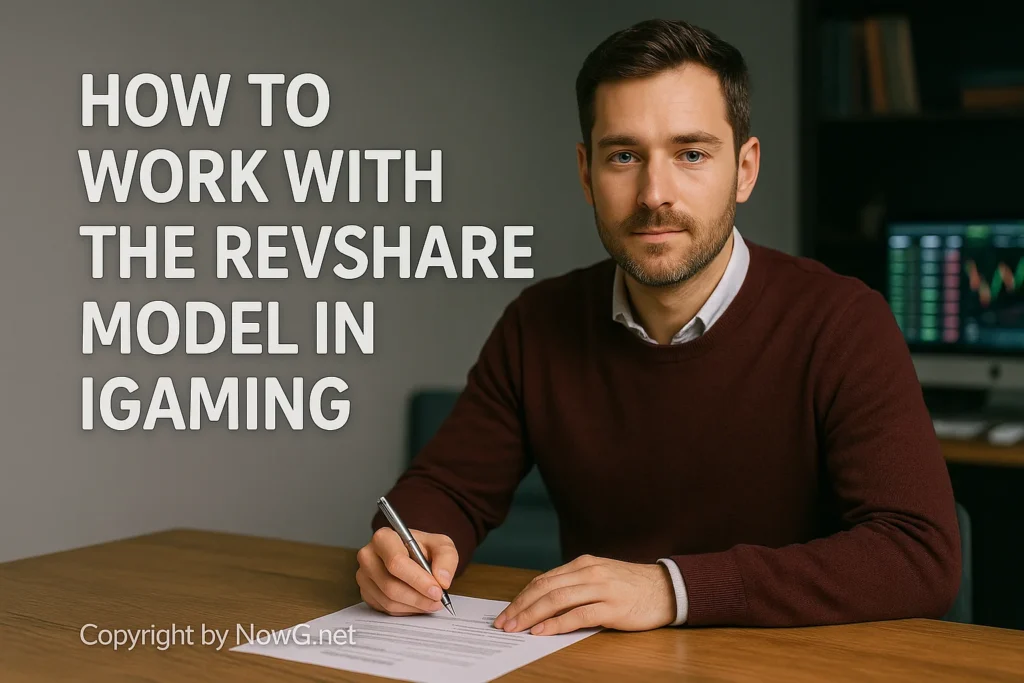Last Updated on October 29, 2025 by Caesar Fikson
Revenue share remains the heartbeat of iGaming affiliate partnerships. Done well, revshare marketing compounds profitable player cohorts month after month and turns affiliates into long-term growth partners rather than one-off traffic vendors. Done poorly, it becomes a source of margin leakage, contract disputes, and partner churn.
This operator-grade playbook explains how to design, price, operate, and scale a revshare model (casino and sportsbook) end-to-end—using data you can defend and terms that partners trust.
RevShare 101: What It Is—and What It Isn’t
Let’s clear up the basics, because what is revshare still gets muddied in contracts. The straightforward revshare meaning—or what is rev share—is this: you pay affiliates a percentage of net gaming revenue (NGR) generated by players they refer, over time. That’s the essence of a revshare program.

It differs from CPA (cpa revenue share), where you pay a fixed fee for a qualified player (e.g., registration + KYC + first-time deposit). With rev share, payouts align to the value the player actually produces as they wager and engage. Hybrid deals (smaller CPA + smaller rev-share) sit in the middle and are useful when partners need cash flow but you want value alignment. If your casino business model depends on retention (it does), revshares reward affiliates who deliver players that stick, cross-sell, and grow into VIPs.
Get the Math Right First: NGR You Can Defend
Every sustainable rev-share program starts with reliable NGR math. Publish the formula in your terms; ambiguity causes most disputes. In casino, NGR starts at GGR (stakes – winnings) and subtracts only real, measurable costs: the effective cost of bonuses (not the headline value), payment processing and chargebacks, content/risk provider fees, and any taxes/levies you explicitly include by policy. Consistency matters most—if your affiliate reports and finance export don’t reconcile, trust evaporates.
| NGR Component | Example Amount | Notes |
|---|---|---|
| Stakes | €5,000 | Total wagered |
| Winnings | €4,400 | Returned to players |
| GGR (Stakes − Winnings) | €600 | Base for deductions |
| Effective bonus cost | €60 | Realized cost after breakage |
| Payment fees & chargebacks | €24 | Net provider fees |
| Content/Risk provider (15% of GGR) | €90 | Game/odds costs |
| Gaming taxes (20% of GGR) | €120 | If included by policy |
| NGR | €306 | €600 − (60 + 24 + 90 + 120) |
| Rev-share @ 35% | €107.10 | Affiliate commission |
Two frequent pitfalls: use the effective bonus cost (not face value) or you’ll depress partner earnings unfairly; and decide—then publish—whether taxes sit above or below the line in your NGR definition, then be consistent. Sportsbooks add nuance: your base is net hold, not “stakes – wins”, and odds/risk provider fees vary; pay on settled outcomes only to avoid clawbacks when voids and pushes land later.
Pricing the RevShare: LTV, Risk, and the Ladder
A competitive revshare model balances LTV and margin discipline. Start with player LTV, then work backward to a tier that lets affiliates win without torpedoing unit economics. In mature markets, base tiers between 25% and 40% of NGR are common. Rather than inflating the headline rate, layer quality accelerators: award a few extra points when partners hit retention goals (e.g., D30 ≥ 35%) or deliver a meaningful VIP share (e.g., ≥ 15% of NGR). In hotly contested channels, hybrids such as €75–€150 CPA + 20–30% rev-share unlock volume without exploding CAC.
It is always easier to add accelerators than to lower a base you can’t sustain later. If you need bridge cash flow for a partner while LTV accrues, deploy a temporary hybrid and phase into pure rev-share once payback is proven.
Policy Guardrails That Prevent Pain Later
Set a few guardrails once; save yourself hundreds of emails. Start with negative carryover. If you promote “no negative carryover,” implement a high-roller quarantine so a single whale’s heater doesn’t wipe a partner’s slate or your margin. If you carry negatives, cap the amount or time-limit it (e.g., auto-reset after three months) to keep partners engaged. Codify partner-of-record logic (30–45 day click/postback window; last eligible click rules) and your brand-bidding/coupon policy with specific evidence standards and de-credit rules. Finally, publish payout terms and currencies—monthly pay (15–30 day processing), thresholds by currency, and support for EUR/USD/GBP plus local rails in key GEOs to reduce FX noise.
Enforcement should be predictable and evidence-led. This is where an iGaming-native platform matters. Scaleo captures postbacks, SERP brand-bid proofs, device/ASN fingerprints, and yields clean audit trails so disputes don’t devolve into screenshots and guesswork.
Tracking Beyond FTD: The Wagering Stream
FTD (first-time deposit) is essential, but it’s only the beginning. To run revshare marketing properly, you need the wagering stream and outcomes tied to the originating click/partner: registrations, KYC, FTD, wagers, bet settlements, bonus credit/consumption, chargebacks, and withdrawals. Player IDs must be stable and partner-mapped so affiliate reports reconcile to finance. With Scaleo, FTD and wagering/result events are native, NGR is configurable per brand/GEO, and partner-visible reports tie out to your finance export.
Quality Control Without Killing Conversion
Fraud, incent traffic, and grey-hat arbitrage exist. Filters must be proportionate or you’ll crush legitimate conversions. Focus on a handful of high-signal checks and pair each with a measured response, then document outcomes consistently.
| Signal | What It Suggests | Balanced Response |
|---|---|---|
| Many FTDs from same ASN/device cluster | Botting or incent traffic | Step-up KYC for that cohort; reduce caps; manual review queue |
| CTR spikes with near-zero registrations | Fake clicks or mis-targeting | Pause creative/source; require source transparency; retest |
| Brand-bidding detected in SERPs | Cannibalizing direct | De-credit tied conversions; written warning; repeat = suspension |
| Bonus clear-&-cash patterns | Arbitrage/abuse | Remove bonus eligibility; adjust tiers; flag cohort |
| GEO/payment mismatch (VPN) | Synthetic accounts | GEO-lock offers; block payout method; request proof of funds |
Prefer automation where possible. Scaleo’s built-in device/ASN heuristics, velocity checks, and brand-bidding detection, paired with clear evidence logs, allow fast, fair enforcement.
Reporting That Keeps Everyone Honest (and Motivated)
Affiliates push harder when they can see progress and predict earnings; you sleep better when data answers questions before they’re asked. Good reporting exposes partner-level performance—clicks, registrations, FTDs, NGR, rev-share, D7/D30 retention, VIP share, EPC—and lets you cut cohorts by acquisition week, GEO, product, and device. Forecasts derived from trailing LTV and current cohort shape prevent “month-end surprise.” Disputes vanish when your interface shows the NGR formula inline, itemizes deductions, and permits player-level drill-down.
Conversion Ingredients Affiliates Can’t Fix for You
Affiliates deliver intent; your funnel must convert it. Aim for sub-60-second onboarding from click to first bet/spin once KYC passes. Use dynamic, risk-based step-up KYC rather than blanket friction so VIPs glide while higher-risk clusters get guardrails. Expand local payment rails and offer instant withdrawals where permissible; fast cash-out drives retention and affiliate goodwill. Treat bonus design as a margin lever: track effective bonus cost and personalize reloads rather than leaning on blunt 100% matches that bruise NGR. Cross-sell thoughtfully—sports downtime is casino’s moment, and loyal casino players respond to event-based sportsbook promos.
Payments and billing clarity matter too. If you operate multiple payout rails, keep finance in lockstep with operations.
A Practical RevShare Ladder That Rewards Real Value
Base tiers are easy to copy; quality incentives are where you win. Attach accelerators to outcomes that create value, not just volume. Here’s a reference structure that stays competitive while rewarding the behavior you want to scale:
| Monthly Partner NGR | Base Rev-Share | Quality Accelerator |
|---|---|---|
| €0–€10k | 25% | +2% if D30 retention ≥ 35% |
| €10k–€30k | 30% | +3% if VIP NGR ≥ 15% |
| €30k–€75k | 35% | +3% with 60 days brand-bid clean |
| €75k+ | 40% | +5% under quarterly growth MOU |
Need short-term stability during seasonality or new market launches? Offer a temporary hybrid (e.g., €100 CPA + 20% rev-share) and convert back to pure rev-share once cohorts prove out.
Handling Negative Carryover and High-Variance Cohorts
Variance is a reality. Your policies should de-risk both the affiliate and your margin. If you offer no negative carryover, quarantine high-roller swings in a separate ledger so a single whale doesn’t erase a partner’s month. If you do carry negatives, cap the amount or duration (e.g., auto-reset after one month) so partners don’t disengage. When volatility spikes—marquee sports events, fresh GEOs—use a hybrid smoothing period to stabilize cash flow on both sides. All three are configurable in Scaleo iGaming affiliate marketing software per partner/brand, so you avoid spreadsheet exceptions.
Contracts & Compliance: Keep It Readable, Keep It Enforceable
Define NGR precisely and consistently. State prohibited channels (unsolicited email, push spam), brand-bidding restrictions, coupon policy, and cloaking prohibition. Publish payout schedules, currencies, thresholds, and the exact withhold/chargeback logic for fraud. Define partner-of-record duration and reassignment rules.
Enforcement should be fast and fair; Scaleo retains the audit trail (clicks, postbacks, and captured SERPs for brand-bidding) so decisions are evidence-led, not opinion-led.
Sportsbook vs Casino: Operational Differences That Matter
Sportsbook looks similar to casino on the surface, but a few differences matter to your rev-share policy. Bets settle only when events conclude—pay only on settled outcomes and document how voids/pushes flow through NGR.
Expect seasonality spikes; consider temporary hybrid floors to keep affiliates liquid when they pre-fund media buys. Sports margins can be thinner; deliberate casino cross-sell lifts LTV and stabilizes NGR. Be explicit about treatment of free bets, boosts, and cash-out mechanics so the model never surprises either side.
GEOs, Currencies, and Taxes
Rev-share dynamics change with regulation, payments, and taxation. Local rails reduce abandonment and payment costs (directly improving NGR). Fix an FX basis period (e.g., monthly ECB close) to avoid exchange-rate arguments. Some GEOs require withholding on affiliate earnings; support split payouts so a portion lands in a designated tax wallet while the balance reaches the partner.
Scaleo supports multi-currency ledgers, GEO-specific offers, and payout splits so a global program remains coherent.
Migrating to Rev-Share (or to a New Platform) Without Chaos
Moving from CPA to revshare—or switching platforms—doesn’t have to be messy. Define the destination NGR and publish it early. Run one parallel billing cycle so affiliates see legacy math and new math side-by-side. Import partner-of-record and player cohorts so earnings continuity is preserved. Use hybrids as a bridge for key partners who rely on up-front cash flow. The Scaleo team handles POR imports, cohort mapping, and parity checks so you can flip the switch without trust erosion.
Why Scaleo Is Built for iGaming Rev-Share
Scaleo is optimized for iGaming economics, not retrofitted from generic affiliate tools. iGaming-native events—first-time deposit (FTD), wagers, results, bonuses—are first-class citizens. NGR is configurable per brand/GEO with player-level drill-downs, and exports reconcile to your books. Rev-share, CPA, and hybrids live under one roof, with negative carryover controls and high-roller quarantine you can set per partner. Anti-fraud and brand-bidding protections come with evidence, not guesswork. Smartlinks, deep links, GEO/device routing, creative hubs, and auto-localized assets accelerate activation.
A 3-tier sub-affiliate framework expands reach; multi-currency payouts and automated invoicing keep ops lean; clean APIs/webhooks connect your cashier, CRM, and BI without duct tape.
Conclusion
A durable revshare program isn’t a rate card—it’s a system. Define NGR precisely, price to LTV with quality accelerators, enforce a small set of clear guardrails, and wire tracking that reconciles to finance. Run a tight operating cadence: improve onboarding speed, personalize bonuses, widen local payments, cross-sell across products, and keep affiliates informed with transparent reporting. That’s how revshare marketing compounds instead of stalls.
If you want to launch—or fix—revshare the right way, without rebuilding plumbing or refereeing monthly math fights, Scaleo was built for this. Configure NGR, migrate partner-of-record, and go live with hybrid and rev-share ladders in weeks, not quarters.




